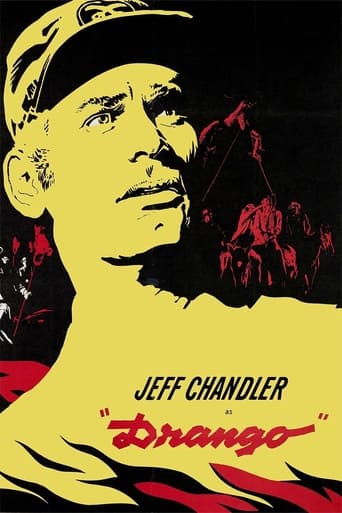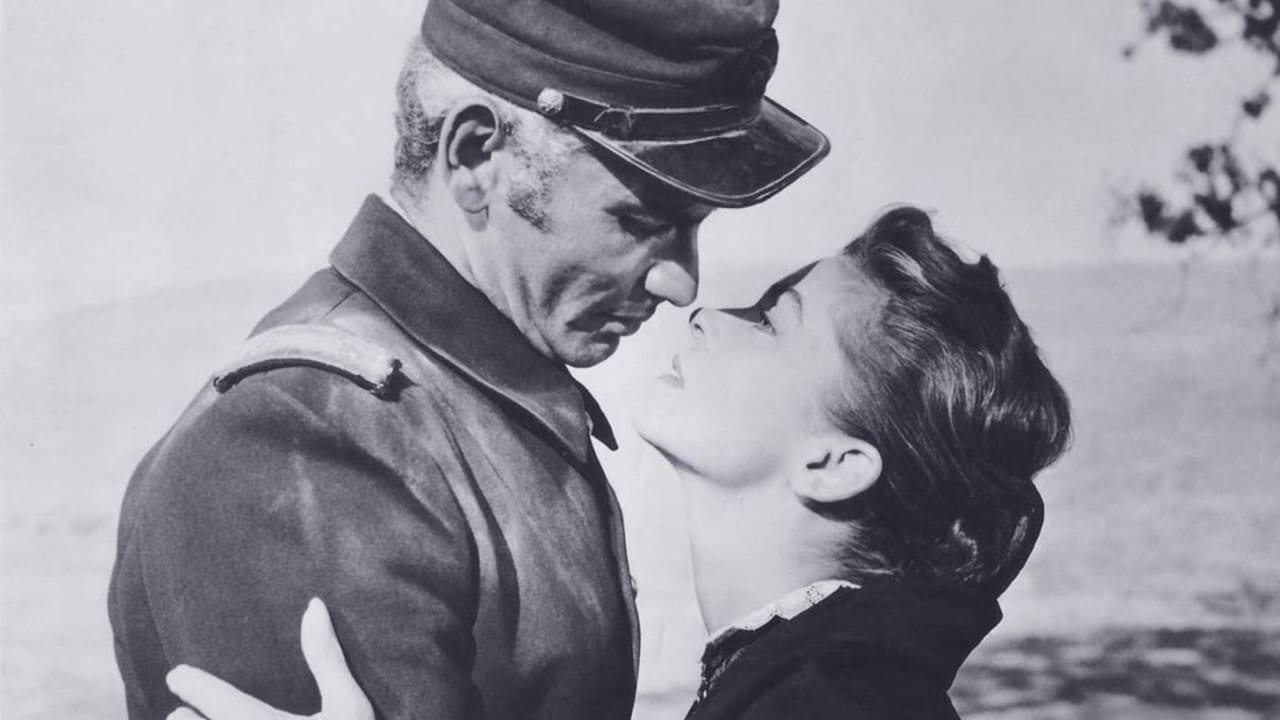Spikeopath
Drango is directed by Hall Bartlett and Jules Bricken and Bartlett writes the screenplay. It stars Jeff Chandler, Joanne Dru, Julie London, Donald Crisp and John Lupton. Music is by Elmer Berstein and cinematography by James Wong Howe.In the months that followed the War between the States, the South lay in pitiable desolation. Within the people, a fire still smouldered. proud, unbowed, they watched with ominous foreboding as the hated Yankees again rode down upon their land ... this time as military governors.Drango offers up two genuine delights for fans of Westerns and Civil War pieces. Firstly it further adds weight to the pro argument case for Jeff Chandler being under valued as an actor, secondly is that the theme of the reconstruction period at the end of the Civil War simply doesn't have enough cinematic ventures. Here in plot we have Chandler as Major Drango, sent into Kennesaw, Georgia, to help rebuild a town that as part of Sherman's March he helped destroy. He is up against it since nobody trusts him and certain factions want to continue the war.Tone is magnificently set by Wong Howe's (Pursued/Hud) monochrome photography, visually sombre as it portents troubles ahead, this is at one with Major Drango's battle to not only win over the town, but also to exorcise his demons. The bitterness left over from the war is evident, strikingly born out by some scenes that stir the emotional heart, while the political machinations on offer are deftly played into the narrative. The two ladies of the piece are most important, each offering up a different side of the political divide, with both Dru and London competent in their acting turns. Action is played well enough in a film that has more to say in characterisations than blood stirring for sake's sake, all while the great Elmer Bernstein provides a score that tantalises the tonal flow of the narrative. The whole thing is anchored by Chandler's strong performance, for even when he is not delivering potent dialogue from a thought provoking script, he exudes pained anguish via visual touches, believably so.The absence of black characters has rightly been noted across the review spectrum, the area where the story is set and the period of reconstruction at the film's heart demands more insight there. And yes! it can be argued that there's a little bias in the writing. But this holds up as a most intriguing pic, it's well performed, with technical merit as well, whilst simultaneously reminding us all that the end of wars doesn't mean work isn't still to be done. 7/10
weezeralfalfa
At the end of the Civil War, after marching columns of uniformed Confederate soldiers had ceased to exist, there was general fear among Union leaders that a long period of guerilla warfare and civil disobedience might follow. Ex-General Lee, for one, made a speech discouraging this option. This film, in part, deals with this issue. It also deals with the problem in some areas of a lack of food, clothing, shelter and infrastructure, due to the depredations of Union forces. It further dramatizes the plight of Union Loyalists in Confederate territory, with the belated lynching of one. As others have abundantly pointed out, it does not deal with the attitudes and problems of former slaves. I'm sure this omission was intentional, as it would have diluted the emphasis on the perceived antagonistic relationships between many southern whites and their Union military overlords. The main point of the film is the difficulty in convincing southerners of the good intentions of many military governors imposed upon them. I agree with the opinion of some that the screenplay is generally too dark to be a pleasant viewing experience. It might have helped if it had been shot in color. Two women are featured, on opposite extremes of the political spectrum. Joanne Dru plays the daughter of the Union loyalist who was lynched. She is in a difficult position, as she must have been during the war, as she harbors the same attitude toward secession. After a period of hating Major Drango, for failing to protect her father, she gradually warms up to him, and they share a passionate kiss, although it's not clear whether they were destined to go farther. In contrast, Julie London plays a wealthy plantation heiress, apparently spared by the Union army. Her boyfriend, Clay Allen, is the leader of the elements that want to continue the war at the local level by sabotage and raids on Union supply depots. Initially, I though I was looking at and hearing Leslie Howard as Clay, but that couldn't be, as he was killed during WWII. His son, Ronald, played Clay. The easily recognizable Donald Crisp played Judge Allen, Clay's father and critic of his attitude. He comes into prominence late in the film, when he foils Clay's attempt to assassinate Drango, and gives an impressive pro-Drango speech. We have another conflict in the clashing attitudes of Major Drango and his superior: Colonel Bracken. Major Drango represents the conciliatory attitude toward the defeated, espoused by Lincoln. Bracken represents the harsher attitude of the radical Republicans, whose representative will soon replace Drango. In the end, Drango convinced most of the population of this northwest Georgia town that he was more their friend than enemy, despite his conspicuous role in laying waste to this region during Sherman's march to the sea, However, I'm not sure that Drango's last important act: of leading the unarmed populace in a march on the Union fort to beg for more food rations and clothes, will be successful, given Bracken's attitude.See it at YouTube.
funkyfry
I know that "Drango" was sometimes translated as "Django", so I wonder if this could be considered the original Django film? At any rate, it's not very memorable.... the script is pretty good, it opens with a rousing but typical Western ballad, and some good scenes setting up the action with Drango's (Jeff Chandler) interaction with the recently "liberated" Southerners, but the film meanders until it's really nothing better than any other B oater. Chandler's performance is dull, and this is the main cause of the film's lack of luster. Julie London provides some good character moments, but her character almost seems to be coming from another film.
silverauk
The director and writer of this movie, Hall Bartlett knew the far-west because he made a documentary fiction about a Navajo Indian who was brought up in a white school (Navajo 1952). You can see that this movie looks more real than other westerns. Jeff Chandler as Major Drango is an officer who understands this villagers and he has self-reproach because he sacked the village during the civil war. He did it by order but anyway he wants to make it good. The officer of the confederation, Captain Marc Banning (John Lupton) is full of lust for revenge and at the end there will be the confrontation with his own father -the past- and with Major Drango who claims a peaceful future for the people who lost the war. After each war people have to try to live together again but all wounds cannot be healed in some months. This movie is a serious attempt to show the psychological difficulties in the reconstruction of a nation after a civil war.


 AD
AD



